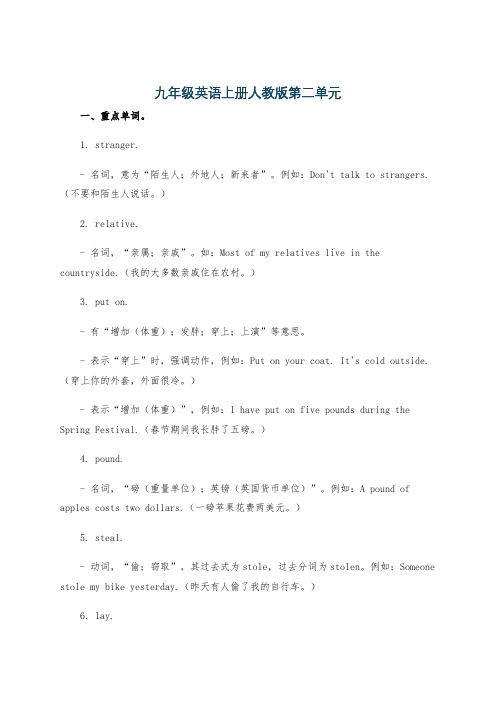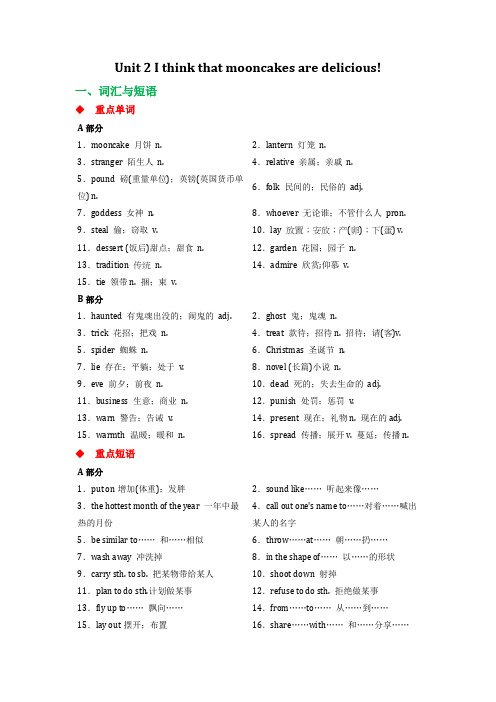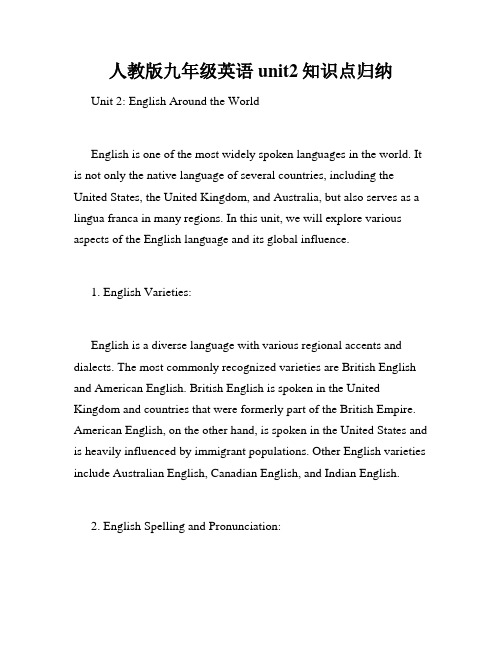人教版九年级英语第二单元知识点汇总
九年级英语上册人教版第二单元

九年级英语上册人教版第二单元一、重点单词。
1. stranger.- 名词,意为“陌生人;外地人;新来者”。
例如:Don't talk to strangers.(不要和陌生人说话。
)2. relative.- 名词,“亲属;亲戚”。
如:Most of my relatives live in the countryside.(我的大多数亲戚住在农村。
)3. put on.- 有“增加(体重);发胖;穿上;上演”等意思。
- 表示“穿上”时,强调动作,例如:Put on your coat. It's cold outside.(穿上你的外套,外面很冷。
)- 表示“增加(体重)”,例如:I have put on five pounds during the Spring Festival.(春节期间我长胖了五磅。
)4. pound.- 名词,“磅(重量单位);英镑(英国货币单位)”。
例如:A pound of apples costs two dollars.(一磅苹果花费两美元。
)5. steal.- 动词,“偷;窃取”,其过去式为stole,过去分词为stolen。
例如:Someone stole my bike yesterday.(昨天有人偷了我的自行车。
)6. lay.- 动词,“放置;安放;产(卵);下(蛋)”,其过去式为laid,过去分词为laid。
例如:The hen lays an egg every day.(这只母鸡每天下一个蛋。
)- 区别于lie(躺;位于),lie的过去式为lay,过去分词为lain。
7. dessert.- 名词,“(饭后)甜点;甜食”。
例如:Ice - cream is my favorite dessert.(冰淇淋是我最喜欢的甜点。
)8. garden.- 名词,“花园;园子”。
例如:There are many beautiful flowers in the garden.(花园里有许多美丽的花朵。
人教版九年级英语第二单元知识点梳理

人教版九年级英语第二单元知识点梳理Unit 2 I think that moon cakes are delicious!一、短语:1.the Lantern Festival元宵节2.the Dragon Boat Festival端午节3.the Water Festival泼水节4.remind sb.of使某人想起5.eat five meals a day一天吃五餐6.put on five pounds体重增加了五磅7.treat sb.with.用/以……对待某人8.be similar to...与.......相似9.end up最终成为/处于10.share sth.with sb.与……分享……11.as a result结果12.one...the other...(两者中的)一个…另一个…13.take sb.out for dinner带某人出去吃饭14.dress up乔装打扮15.haunted house鬼屋16.the beginning of new life新生命的开始二、知识点:1.宾语从句:(三大考点:引导词、时态和语序。
)宾语从句在复合句中作主句的宾语,由连接词+主语+谓语构成,常由下面的这些词引导:①由that引导,表示陈述意义,that可省略:He says(that)he is at home.他说他在家里。
②由if或whether引导,表示一般疑问意义(带有是否、已否、对否等):I don’t know if/whether Wei Hua likes fish.我不知道韦华是否喜欢鱼。
③由连接代词、连接副词(疑问词)引导,表示特殊疑问意义:Do you know what he wants to buy?你知道他想要买什么吗?④从句时态要与主句一致:当主句是一般现在时,从句根据情况使用任何时态;当主句是一般过去时,从句应使用过去某时态(一般过去时,过去进行时,过去将来时,过去完成时)He said(that)he was at home.他说他在家里。
最全面人教版九年级全册英语第二单元知识点归纳总结

Unit 2 I think that mooncakes are delicious!一、词汇与短语◆重点单词A部分1.mooncake 月饼n.2.lantern 灯笼n.3.stranger 陌生人n.4.relative 亲属;亲戚n.5.pound 磅(重量单位);英镑(英国货币单位) n.6.folk 民间的;民俗的adj. 7.goddess 女神n.8.whoever 无论谁;不管什么人pron. 9.steal 偷;窃取v.10.lay 放置;安放;产(卵);下(蛋) v. 11.dessert (饭后)甜点;甜食n.12.garden 花园;园子n. 13.tradition 传统n.14.admire 欣赏;仰慕v.15.tie 领带n. 捆;束v.B部分1.haunted 有鬼魂出没的;闹鬼的adj.2.ghost 鬼;鬼魂n.3.trick 花招;把戏n.4.treat 款待;招待n. 招待;请(客)v. 5.spider 蜘蛛n.6.Christmas 圣诞节n.7.lie 存在;平躺;处于v.8.novel (长篇)小说n.9.eve 前夕;前夜n.10.dead 死的;失去生命的adj. 11.business 生意;商业n.12.punish 处罚;惩罚v.13.warn 警告;告诫v.14.present 现在;礼物n. 现在的adj. 15.warmth 温暖;暖和n.16.spread 传播;展开v. 蔓延;传播n.◆重点短语A部分1.put on增加(体重);发胖2.sound like……听起来像……3.the hottest month of the year 一年中最热的月份4.call out one's name to……对着……喊出某人的名字5.be similar to……和……相似6.throw……at……朝……扔……7.wash away 冲洗掉8.in the shape of……以……的形状9.carry sth. to sb. 把某物带给某人10.shoot down 射掉11.plan to do sth.计划做某事12.refuse to do sth. 拒绝做某事13.fly up to……飘向……14.from……to……从……到……15.lay out摆开;布置16.share……with……和……分享……17.come/be/get back 回来18.give sth. to sb. 给某人某物19.take sb. out for dinner 带某人出去吃晚饭20.help (to) do sth. /help with sth. 帮助做某事B部分1.dress up打扮;装扮2.trick or treat 不招待就使坏3.learn about 了解4.think of/think about 想到;考虑5.the true meaning of………的真正意义6.the importance of…………的重要性7.a novel written by…………写的小说8.care about 关心9.used to do sth. 过去常常做某事10.warn sb. to do sth. 告诫某人去做某事11.end up最终成为;最后处于12.expect sb. to do sth. 期待某人做某事13.take sb. back to sp. 把某人带回到某地14.wake up 醒来15.remind sb. of sth. /sb.使某人想起某物/16.decide to do sth. 决定做某事某人17.change one's life改变某人的生活18.promise to do sth. 承诺做某事19.in need需要20.treat sb. with……用……招待某人21.the beginning of…………的开端22.give birth to life 孕育新生命23.a symbol of…………的象征24.not only…but also…不但…而且…25.spread……around 到处传播……26.give out 分发◆重点句子A部分1.比尔想知道他们明年是否可以再吃到粽子。
九年级英语人教版第二单元

人教版九年级英语第二单元知识点总结一、重点词汇解析1.mooncake /ˈmuːnkeɪk/ 月饼-解析:由moon(月亮)和cake(蛋糕)组成,是中秋节的传统食品。
-例句:We eat mooncakes on Mid-Autumn Festival.(我们在中秋节吃月饼。
)ntern /ˈlæntən/ 灯笼-解析:一种照明工具,通常在节日中使用。
-例句:There are many beautiful lanterns in the park.(公园里有很多漂亮的灯笼。
)3.stranger /ˈstreɪndʒə(r)/ 陌生人-解析:不认识的人。
-例句:Don't talk to strangers.(不要和陌生人说话。
)4.relative /ˈrelətɪv/ 亲属;亲戚-解析:和自己有血缘或婚姻关系的人。
-例句:We visited our relatives during the holiday.(我们在假期拜访了亲戚。
)5.put on 增加(体重);发胖-解析:指身体的重量增加。
-例句:She has put on some weight.(她长胖了一些。
)y /leɪ/ 放置;安放;产(卵);下(蛋)-解析:过去式和过去分词分别为laid /leɪd/。
-例句:She laid the book on the table.(她把书放在桌子上。
)二、重点短语1.the Water Festival 泼水节-解析:一些国家和地区的传统节日。
-例句:The Water Festival is very lively.(泼水节非常热闹。
)2.the Dragon Boat Festival 端午节-解析:中国的传统节日,有赛龙舟、吃粽子等习俗。
-例句:We eat zongzi on the Dragon Boat Festival.(我们在端午节吃粽子。
)3.the Spring Festival 春节-解析:中国最重要的传统节日。
人教版九年级英语unit2知识归纳

人教版九年级英语unit2知识归纳人教版九年级英语unit2知识1单词Mooncake ['mu:nke?k] n. 月饼lantern [?l?nt? (r)n] n. 灯笼stranger [?streind?? (r)] n. 陌生人relative [?rel?tiv] n. 亲属;亲戚put on 增加(体重);发胖pound [paund] n. 磅(重量单位);英镑folk [f?uk] adj. 民间的;民俗的goddess [?g?des][?ɡɑd?s] n. 女神whoever [hu:?ev? pron.无论是谁;不管谁;任何人steal [sti:l] v. (stole [st?ul], stolen [st?ul?n]) 偷;窃取lay [lei] v. (laid [leid], laid) 放置;产(卵)lay out 摆开;布置dessert [di?z?:(r)t] n.( 饭后)甜点;甜食garden [ga:(r)dn] n. 花园;园子 tradition [tr??d??n] n.传统admire [?d?mai? (r)] v. 欣赏;仰慕tie [tai] n. 领带 v. 捆;束haunted [?h?:ntid] adj.有鬼魂出没的 ghost [g?ust] n. 鬼;鬼魂trick [trik] n. 花招;把戏treat [tri:t] n. 款待;招待;请客spider [?spaid?r)] n. 蜘蛛Christmas [?krism?s] n. 圣诞节lie [laI] v. (lay [leI],lain [leIn]) 存在;平躺;处于novel [?n?vl] [?na:vl] n.(长篇)小说eve [i:v] n.(尤指宗教节假日的)前夕;前夜dead [ded] adj.死的;失去生命的business [?bizn?s] n. 生意;商业punish [?p?nis] v. 处罚;惩罚 warn [w?:(r)n] v. 警告;告诫end up 最终成为;最后处于present [preznt] n. 现在;礼物 adj. 现在的nobody [n?ub?di] [n?uba:di] pron. 没有人 warmth [w?:(r)mθ] n. 温暖;暖和spread [spred] v. 传播;展开 n. 蔓延;传播Macao [m??kau] 澳门Chiang Mai [?t?i?n?maI], [d?a:nmaI] 清迈(泰城市)Water Festiwal 泼水节Mid-Autumn中秋节Mother's Day母亲节Father's Day 父亲节Halloween [?h?l?u?i:n] 万圣节前夕A Christmas Carol 《圣诞欢歌》(小说名)Easter 复活节Clara [?kla:r?] [?kler?] 克拉拉(女名)Santa [?s?nt?] Claus [kl?:z] 圣诞老人Charles [t?a:(r)lz] Dickens [?dik?nz] 查尔斯 ? 狄更斯(英)Scrooge [skru:d?] 斯克鲁奇 n.(非正式)吝啬鬼Jacob [?d?eik?b]Marley [?ma:(r)li] 雅各布 ? 马利人教版九年级英语unit2知识2知识梳理【重点短语】1.put on 增加(体重);发胖2.care about 关心; 在乎3.end up 最终成为,最后处于4.not only ……but also……不但……而且……5.shoot down 射下ed to do 过去常常做……7.remind sb. of 使某人想起8.give out 分发发放9.the water festival 泼水节10.the Chinese spring festival 中国春节11.next year 明年12.sound like 听起来像13.each other 互相彼此14.in the shape of 以……的形状15.on mid-autumn night 在中秋之夜16.fly up to 飞向y out 摆开布置18e back 回来19.as a result 结果因此20.Mother’s day 母亲节21.more and more popular 越来越受欢迎22.think of 想起 ;认为 ;思考23.dress up 装扮穿上盛装24.the importance of ……的重要性25.make money 挣钱26.in need 需要帮助处于困境中27.between …and…在……和……之间28.the dragon boat festival 龙舟节29.the lantern festival 元宵节30.like best 最喜欢31.go to …for a vacation 去……度假32.be similar to 与……相似33.wash away 冲走洗掉34.Mid-autumn festival 中秋节35.shoot down 射下36.call out 大声呼喊37.the tradition of ……的传统38.at night 在夜里; 在晚上39.one…,the other…一个……,另一个…...40.Father’s day 父亲节【重点句型】1. I think that they’ re fun to watch.我认为它们看着很有意思。
人教版九年级unit2知识点

人教版九年级unit2知识点九年级英语知识点总结Unit 2在九年级英语课程的第二单元中,我们学习了许多重要的知识点。
本文将对这些知识点进行总结和回顾,以帮助大家更好地复习和巩固所学内容。
一、动词时态与语态1. 一般现在时:表示经常性或习惯性的动作或状态。
eg. She often goes to the park on weekends.2. 现在进行时:表示现阶段正在进行的动作。
eg. They are watching a movie in the cinema.3. 一般过去时:表示过去某个时间发生的动作或存在的状态。
eg. Yesterday, I visited my grandparents.4. 过去进行时:表示过去某个时间正在进行的动作。
eg. We were playing football in the park when it started to rain.5. 一般将来时:表示将来某个时间会发生的动作或存在的状态。
eg. They will have a picnic next Sunday.6. 被动语态:表示动作的接受者重要于动作的执行者。
eg. The book was written by Mark Twain.二、形容词与副词比较级与最高级1. 比较级:用来比较两个事物的程度,常在形容词前加-er或在副词前加more。
eg. This book is more interesting than that one.eg. She runs faster than me.2. 最高级:用于比较多于两个事物的程度,常在形容词前加-est或在副词前加most。
eg. It was the most beautiful sunset I have ever seen.三、名词所有格1. 名词所有格表示所属关系,一般在名词后加's。
eg. This is Mary's pencil.2. 若名词是复数形式且以-s结尾,则只需在末尾加'。
人教版九年级英语第二单元知识点汇总

人教版九年级英语第二单元知识点汇总人教版九年级英语第二单元知识点总结Unit 2 I think that mooncakes are delicious一单词XXX二1.put短语put on增加,穿上put up张贴,搭建,举起put away收拾好put off(doing)推迟put down记下,放下put out扑灭put into放进2.XXXlie–lied–lied-lying,说谎lie—lay–lain-lying,躺/位于,存在于lay—laid–laid-laying,放置/下蛋,产卵3.admireadmire sb, admire sth, XXXXXX.XXX.4.tie v系n领带/present n=gift礼物在场的be present目前at presentmean adj吝啬的v意义是,意味着mean doing sth计划做某事mean to do sth5.play a trick on sb /play tricks on sb be a time for doing sth/to do sthXXX (万圣节用语)不给糖果就捣蛋16.XXX n7.warn sb (not) to do sthput…around…(put things XXX)放在…周围take/show sb around带或人到处转8.end upend up with背面的宾语是其主语的一局部,而end up in 背面的宾语是其主语(一件工作、一个举动等)的结果。
:XXX XXX.(a song是主语XXX的一局部,即歌曲以后全部集会竣事).XXX(failure是主语Their effort 的成效).end up XXX以做…竣事9. in two weeks,两周后,用普通未来时XXXplan to do sth = plan on doing sth =make plans to do sth.计划做某事句型:such+a/an+形容词+单数名词+ that从句句型:such+形容词+复数可数名词+ that从句句型:such+描述词+不成数名词+ that从句句型;so+描述词/副词+that从句句型:so +描述词+ a/an +单数名词+ that从句句型;so + many/ few +复数名词+ that从句句型:so +much/ little +不可数名词+ that从句211. refuse to do XXX回绝去做某事接不定式作宾语的动词:三个但愿两应允(hope, wish, want, agree, promise)两个请求莫回绝(demand, ask, refuse)设法学会做决定(manage, learn, decide)不要假装在选择(pretend, choose)12.dress sb. up给某人打扮dress up in +衣服/颜色dress up as +人XXX给或人本人穿衣服13.the Water Festival, the Dragon Boat Festival, the Spring Festival, the Lantern Festival, watch theraces, a little crowded, like sth best, go to sp for one’s vacation, enjoy doing sth., eat out, five meals a day,sound like, throw water at each other, wash away, have good luck, in the shape of, carry …to…, shootdown, try to do sth., fly up to, lay out, start the tradition of, one…, the other…, give…to…,ta ke sb outfor sth, more and more popular, care about, make money,expect sb. to do sth., wake up, find out, inneed, make sb. do sth., give birth to life 141)Bill XXX.2)Bill wonders whether they’ll have the sweet XXX.next year将来时the next year过去时3)I wonder if it’s similar to the water festival of Dai people in XXX Province.be similar to, be the same as, be different from4)Chinese people have been celebrating Middle-XXX XXX)They carry people’s wishes to the families they love and miss.6)However, most people think that the story of Chang’e is the most touching.7)XXX.8)Hou Yi was so sad that he called out her name to the moon every night.3call out … to…对着……大呼……9)XXX, XXX.Not only do people spread them around in different XXXhunt, but they also give out these treats as gifts.句中的not only ... but (also) ...意为“不但……而且……”。
人教版九年级英语unit2知识点归纳

人教版九年级英语unit2知识点归纳Unit 2: English Around the WorldEnglish is one of the most widely spoken languages in the world. It is not only the native language of several countries, including the United States, the United Kingdom, and Australia, but also serves as a lingua franca in many regions. In this unit, we will explore various aspects of the English language and its global influence.1. English Varieties:English is a diverse language with various regional accents and dialects. The most commonly recognized varieties are British English and American English. British English is spoken in the United Kingdom and countries that were formerly part of the British Empire. American English, on the other hand, is spoken in the United States and is heavily influenced by immigrant populations. Other English varieties include Australian English, Canadian English, and Indian English.2. English Spelling and Pronunciation:English spelling can be quite challenging due to its historical development and the influences of other languages. It is known for its irregularities and discrepancies between spelling and pronunciation. For example, the word "ough" can be pronounced differently in words like "rough," "bough," "through," and "cough." Additionally, the silent letters in words such as "knight" and "honest" add to the complexity of English spelling.3. English Grammar:English grammar consists of various aspects, including tenses, verb patterns, and sentence structure. Tenses play a crucial role in expressing time and actions. The basic tenses include present, past, and future, which can be further modified with perfect or continuous aspects. Verbs can also have different patterns, such as transitive, intransitive, or phrasal verbs. Furthermore, English sentence structure follows a subject-verb-object order in declarative sentences.4. English Words and Vocabulary:English vocabulary is diverse and constantly evolving. It borrows words from other languages and incorporates them into its lexicon. This can be seen in words of French origin like "entrepreneur" and Latinorigin like "circumference." Furthermore, English has a large number of synonyms and antonyms, which provide speakers with a wide range of expression.5. English as a Global Language:English has become the lingua franca of the world due to historical, cultural, and economic reasons. It is used as a common language for international communication in various fields such as business, technology, and academia. Proficiency in English opens up opportunities for individuals in terms of education, employment, and cross-cultural understanding.In conclusion, Unit 2 of the 9th-grade English textbook provides a comprehensive overview of the different aspects of the English language. Understanding the regional varieties, spelling, grammar, vocabulary, and global influence of English allows students to develop their language skills and navigate the interconnected world we live in. Mastery of the English language not only enhances communication but also broadens horizons and fosters a deeper appreciation for cultural diversity.。
- 1、下载文档前请自行甄别文档内容的完整性,平台不提供额外的编辑、内容补充、找答案等附加服务。
- 2、"仅部分预览"的文档,不可在线预览部分如存在完整性等问题,可反馈申请退款(可完整预览的文档不适用该条件!)。
- 3、如文档侵犯您的权益,请联系客服反馈,我们会尽快为您处理(人工客服工作时间:9:00-18:30)。
人教版九年级英语第二单元知识点总结Unit 2 I think that mooncakes are delicious一单词mooncake lantern stranger relative put on pound folk goddess whoever steal lay out dessert garden tradition admire tie haunted ghost trick treat spider Christmas lie novel eve dead business punish warn end up present warmth spread lay二1.put短语put on 增加,穿上 put up张贴,搭建,举起 put away收拾好put off(doing)推迟 put down记下,放下 put out扑灭 put into放进ylie – lied – lied-lying,说谎lie—lay – lain-lying,躺/位于,存在于lay—laid – laid-laying, 放置/下蛋,产卵3.admireadmire sb, admire sth, admire sb for sthsounds/looks/tastes/feels/smells + adj.sounds/looks/tastes/feels/smells +like +n.4.tie v 系 n 领带 /present n=gift礼物在场的 be present 目前 at presentmean adj 小气的 v 意思是,意味着mean doing sth打算做某事 mean to do sth5.play a trick on sb /play tricks on sb be a time for doing sth/to do sthtrick or treat (万圣节用语)不给糖果就捣蛋6.treat/regard/see sb as+ n7.warn sb (not) to do sthput…around…(put things like spiders and ghosts around the door) 放在…周围take/show sb around带某人四处转8.end upend up with后面的宾语是其主语的一部分,而end up in后面的宾语是其主语(一件事情、一个活动等)的结果。
:The meeting ended up with a song.(a song是主语The meeting 的一部分,即歌曲之后整个会议结束). Their effort ended up in failure(failure是主语Their effort 的结果).end up doing sth 以做…结束9. in two weeks,两周后,用一般将来时remind sb. of sthplan to do sth = plan on doing sth =make plans to do sth.计划做某事10.so.......that/such......that引导结果状语从句句型:such+a/an+形容词+ 单数名词 + that从句句型:such+形容词+ 复数可数名词 + that从句句型:such+形容词+ 不可数名词 + that从句句型;so+形容词/副词+that从句句型: so +形容词 + a/an + 单数名词 + that从句句型;so + many/ few + 复数名词 + that从句句型: so +much/ little + 不可数名词 + that 从句11. refuse to do sth拒绝去做某事接不定式作宾语的动词: 三个希望两答应(hope, wish, want, agree, promise)两个要求莫拒绝(demand, ask, refuse)设法学会做决定(manage, learn, decide)不要假装在选择(pretend, choose)12.dress sb. up 给某人打扮 dress up in +衣服/颜色dress up as +人 dress oneself 给某人自己穿衣服13.the Water Festival, the Dragon Boat Festival, the Spring Festival, the Lantern Festival, watch the races, a little crowded, like sth best, go to sp for one’s vacation, enjoy doing sth., eat out, five meals a day, sound like, throw water at each other, wash away, have good luck, in t he shape of, carry …to…, shoot down, try to do sth., fly up to, lay out, start the tradition of, one…, the other…, give…to…,take sb outfor sth, more and more popular, care about, make money, expect sb. to do sth., wake up, find out, in need, make sb. do sth., give birth to life141)Bill thinks that the races were not that interesting to watch.2)Bill wonders whether they’ll have the sweet rice dumplings again next year.next year 将来时 the next year 过去时3)I wonder if it’s similar to the water festival of Dai people in Yunnan Province.be similar to, be the same as, be different from4)Chinese people have been celebrating Middle-Autumn Festival and enjoying mooncakes for centuries. 5)They carry people’s wishes to the families they love and miss.6)However, most people think that the story of Chang’e is the most touching.7)Whoever drank this could live forever.8)Hou Yi was so sad that he called out her name to the moon every night.call out … to… 对着……大喊……9)He now treats everyone with kindness and warmth, spreading love and joy everywhere he goes. 15.Not only do people spread them around in different hiding places for an egghunt, but they also give out these treats as gifts.句中的not only ... but (also) ... 意为“不但……而且……”。
当not only位于句首时,其后的主谓要部分倒装。
此外,当not only ... but (also) ... 连接两个代词或名词作主语时,谓语动词要与but (also)后的代词或名词在数上保持一致。
如:( )Not only ___he ___ playing tennis, but also he likes playing basketball.A. does; likeB. do; likeC. did likeD. /;like( ) This is my twin sister, Lucy. Not only she but also I ___ good at drawing.A. isB. amC. Are16.感叹句用来表达喜、怒、哀、乐等强烈感情的句子叫感叹句。
感叹句一般用what或how引导,句末用感叹号。
what修饰名词,how修饰形容词或副词。
1. what引导的感叹句:1) What + a/ an + adj. + 可数单数(+主谓语)!What a brave boy (Tom is)! What an excellent idea (it is)!2) What + adj. + 可数名词复数(+主谓语)! What beautiful pictures (they are)!3) What + adj. + 不可数名词(+主谓语)! What delicious food (it is)!2. how引导的感叹句:How + adj. / adv. + 主语 + 谓语!e.g. How happy the children were! How carefully he is reading!注意:一般情况下,以what和how开头的感叹句可以相互转换,转换后意义不变。
e.g. What a tall building it is! = How tall the building is!17.宾语从句一.宾语从句的定义:在复合句中用作宾语的从句叫宾语从句。
二.三要素A.当宾语从句具有陈述意义时,用that引导。
它在句子中只起引导作用,在口语中常可省略。
当宾语从句具有疑问意义时,可用if或whether引导。
它们在句子中的意思是是否。
或者用连接代词(what, who, which等)或连接副词(when, where, how, why等)引导。
1)当由陈述句充当宾语从句时,用that引导,只起连接作用,在从句中不作成分,也无词义,常被省略。
如:He said that he could finish his work before supper.I believe ( that ) you are right.2)当由一般疑问句充当宾语从句时,用if或whether引导,意为“是否”。
